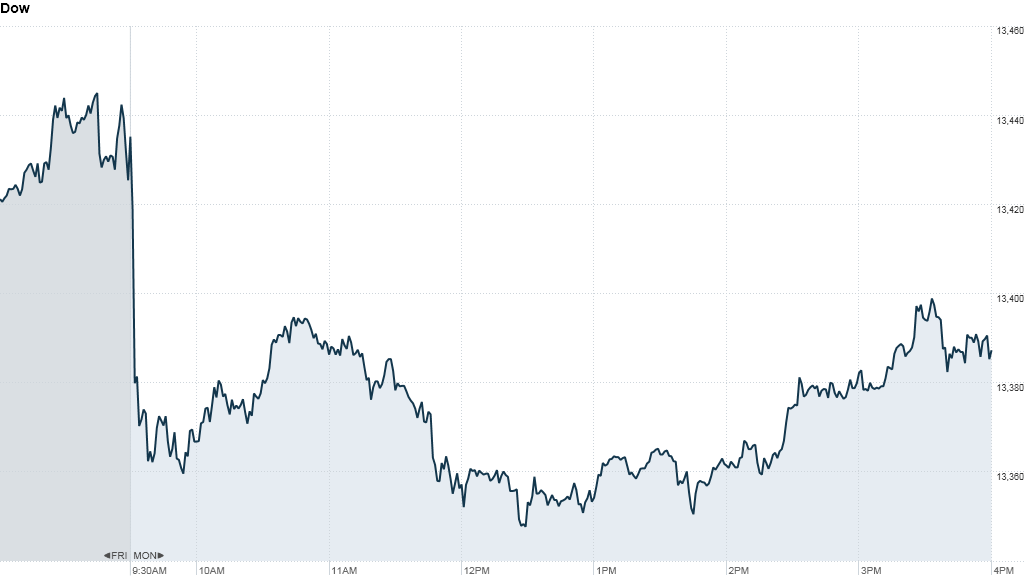U.S. stocks tumbled Monday as investors shift their focus from the nation's fiscal woes to the outlook for corporate earnings.
The Dow Jones Industrial average fell 0.4%, the S&P 500 slid 0.3% and the Nasdaq edged down 0.1%.
The retreat comes as investors prepare for quarterly earnings reports from U.S. corporations. Aluminum producer Alcoa (AA) will be the first major firm to report earnings after the closing bell Tuesday. Wells Fargo (WFC) will release its results Friday.
Overall, earnings for the companies in the S&P 500 are expected to rise 3.3% in the fourth quarter compared with the same period in 2011, according to S&P Capital IQ.
In particular, companies in the industrial sector are expected to post losses in the quarter, while consumer discretionary and telecommunications companies are expected to lead earnings growth, according to Capital IQ.
While revenue could stabilize in the quarter, companies will struggle to beat earnings expectations, analysts at Barclay's wrote in a report. "We suspect earnings season will be a negative for the market overall," said Barclay's.
Meanwhile, bank stocks were in focus after federal regulators announced an agreement with 10 banks that will provide $8.5 billion in relief for troubled homeowners and settle charges the banks mishandled foreclosures for 3.8 million borrowers in 2009 and 2010. Bank of America (BAC), Citigroup (C), JPMorgan (JPM), and Wells Fargo were among the banks involved in the agreement.
Separately, Bank of America announced a $10.3 billion settlement with Fannie Mae to resolve repurchase claims on mortgage loans that were originated before December 31, 2008.
On Sunday, the Basel Committee on Banking Supervision, an international standard setter, watered down some of the more stringent rules for banks, which would have required lenders to hold back cash they could use for lending. The rules were originally proposed to help strengthen banks in the event of another global financial crisis.
U.S.-listed shares of Deutsche Bank (DB) and UBS (UBS) were higher.
"There's a lot of focus on the financials today," said David Lutz, head ETF trader at Stifel Nicolaus.
Related: More savers can convert to Roth 401(k)s under fiscal cliff deal

U.S. stocks rallied in the first week of 2013, with the S&P 500 ending Friday at its highest level since December 2007.
After weeks of trepidation over the fiscal cliff, lawmakers reached a last-minute compromise that forestalled the worst of the crisis. But officials in Washington are now gearing up for a fight over the nation's legal borrowing limit, known as the debt ceiling.
If the ceiling isn't raised by late February or early March, the United States runs the risk of defaulting on its obligations because the Treasury would no longer have enough money available to pay all the country's bills.
"The debt ceiling is the new wall of worry for stocks," said Anthony Conroy, head trader at BNY ConvergEx Group.
European markets ended lower, with shares in Paris suffering the worst declines. The CAC 40 fell 0.9%, London's FTSE 100 sank 0.6% and the DAX in Frankfurt declined 0.6%.
Asian markets ended mixed. The Shanghai Composite added 0.4%, while Hong Kong's Hang Seng advanced 0.1%. Japan's Nikkei dropped 0.8%, despite media reports indicating the government is preparing a fiscal stimulus package.
In the bond market, the yield on the 10-year U.S. Treasury note dipped to 1.9%. The yield rose near 2% last week as investors pulled money out of safer investments and moved into more risky assets.
Oil prices edged higher while gold prices eased. The U.S. dollar edged higher versus the euro and British pound, but fell against the Japanese yen.



